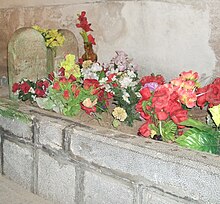Mem û Zîn

The book Mem û Zîn is the main work of the Kurdish poet Ehmedê Xanî (* 1651 , † 1707 ). It is known as the Kurdish national epic and is based on a legend that was previously passed down orally from generation to generation . The content is similar to a Romeo and Juliet story .
Synopsis
Mem , from the Alan clan and Zîn , from the Botan clan, are two lovers who one day find each other. They want to be together, but Beko from the Bakran clan tries to prevent this. Eventually, Mem is murdered because of a Bakir conspiracy.
When Zîn receives the news of Mem's death, she collapses on his grave and dies. She is buried next to Mem. News of Mem and Zîn's deaths spread quickly among the people of Cizîra Botan. The people are angry with Bakir and kill him. He is buried under the feet of Mem and Zîn. A thorn bush, nourished by Bakir's blood, grows from his grave: the roots of malice penetrate deep into the earth between the graves of Mem and Zin. So the two lovers are separated from each other even in death.
Symbolic meaning of the main characters Mem and Zin
For the Kurds, Mem symbolizes the Kurdish people and Zîn the Kurdish country , who remain separated from each other due to unfortunate circumstances and cannot become a unity.
Texts
Among the various stories, the best known is Ehmedê Xanî . Roger Lescot , a French orientalist, supplemented the Memê Alan story in the 1930s with the help of several Kurdish Dengbêj singers from Syria . The legend has partly historical roots, probably originated in the 14th century and was passed on by the Dengbêj. In precise and poetic language, it tells the story of the unhappy love of Mem and Zin, against the background of chivalrous traditions and social conventions. This .... version is closest to the folk tale version . The complete version of the Sage Memê Alan is now an integral part of Kurdish literature.
Film adaptation of the epic
On the basis of the book was 1992 of Ümit Elçi the same film Mem and Zin (dt. Mem and Zin ) is rotated. Since the Kurdish language was banned in Turkey until the end of the 1990s / beginning of the 21st century, the Kurdish epic had to be shot in the Turkish language.
literature
- Komkar: Mem and Zin, Kurdish folk epic. In the version by Roger Lescot and L.-Ch. Wentzel, Cologne 1995.
Web links
- Mem û Zîn . In: Ehsan Yarshater (Ed.): Encyclopædia Iranica (English, including references)